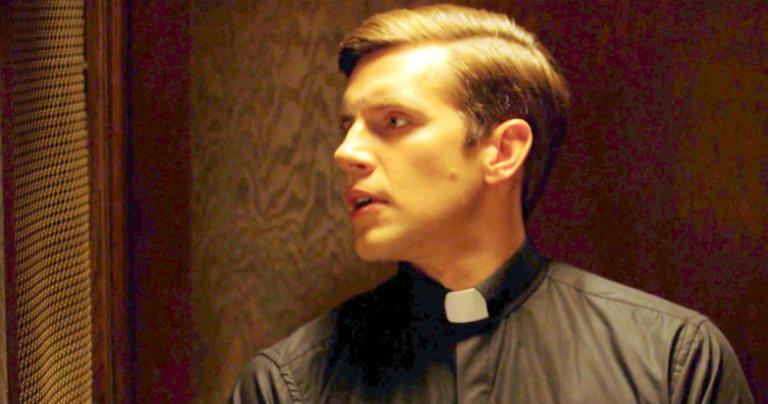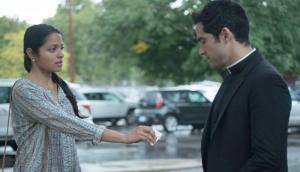 Most Catholic priests take vows of celibacy, but in a large sense, they are married — to the Church. In other words, they’re taken. They’re not available.
Most Catholic priests take vows of celibacy, but in a large sense, they are married — to the Church. In other words, they’re taken. They’re not available.
So why do women chase them?
Last season on Fox’s “The Exorcist,” young Father Tomas Ortega (Alfonso Herrera) gave into temptation and had an affair with Jessica (Mouzam Makkar), a married woman. Let’s unpack that. Yes, he violated his vows of celibacy, but he also violated chastity, and committed adultery. He repented of all those and got back on track, but what about Jessica?
She persistently pursued Father Tomas, even though she knew he was a priest. In the show, she was the unquestioned aggressor. She violated her marriage vows and chastity and committed adultery. Was her sin any less than his? No, not at all. But the show never explored her culpability.
Tomas is a man, with a man’s impulses and feelings. While he should not have succumbed to Jessica’s temptations — nor put himself in the near occasion of sin to start with — his transgression is understandable in purely human terms. But what do we say about a married Catholic woman who sets her sights on a priest, intent on causing him to egregiously sin?
He is plainly and obviously and publicly not available. There is zero ambiguity in that. And yet she goes after him anyway. We all know it happens in real life as well.
In a new movie, called “The Good Catholic,” just released in theaters, we again have a handsome young priest, Father Daniel (Zachary Spicer), pursued by an aggressive woman.
From a review in America magazine:
Daniel is hearing confessions one late Friday night when a woman rushes in and blithely delivers the claim that she has never been to confession before, does not know how it works and oh, by the way, she is dying.
We see where this is going, if not entirely how or, certainly, why. The young woman, Jane (Wrenn Schmidt) is brash, sexy, opinionated—everything the uncertain Father Daniel is not. (Spicer’s guileless look is perfect for a questioning priest.) She also lies. But she gives him something to grasp hold of, the way Father Ollie grasps hold of a mini muffin, or the remote during a basketball game. “You have to find something of your own,” Ollie says, explaining his sports mania to Daniel. “Something selfish and stupid and human.” Jane is, in a sense, Daniel’s March Madness.
Or not. A reviewer should never assess a movie for what it is not, but this viewer was not sure for a long time what exactly “The Good Catholic” was. I had what I thought was a critical revelation—that Jane was intended as Satan personified: She invades Daniel’s life and sanctuary in his hour of doubt, scattering sexual temptation in his path. She is brassy to the point of abrasiveness, the kind of person who puts others on edge while saying “relax.” She expresses no remorse at any time for what she is doing, for the rupture she is bringing to the life of a young priest suffering a crisis of faith. She is almost mocking in her regard of Daniel’s torment. So yes, we were hoping for allegory.
I haven’t seen “The Good Catholic,” and I don’t intend to, so I’ll leave it up to the America reviewer to get into detail on this particular tale.
But there’s a general game behind stories like this. They often exist to show that sex is indispensable to happiness or self-worth; that celibacy is unnatural and destructive; and that, obviously, no one should become a Catholic priest. The woman exists as a mechanism to expose the flaws of the Church and the priesthood.
(Also, the film’s writer/director Paul Shoulberg is the son of a former priest and a former nun, so there is that.)
And even when that’s not the intent, the motives of the woman can remain unexplored.
At the end of “The Exorcist,” there’s really no reckoning for Jessica. Father Tomas endures shame, remorse, a beating from Jessica’s husband, and the pain of confessing his sins. But she just disappears. That’s because the story’s not about her. It never was. She was, again, a mechanism to distract Father Tomas from the demonic possession at hand, a way to lessen his effectiveness against the demon by infecting him with doubt.
Even so, not once does the show explore why Jessica would undertake such a seduction. She’s unhappy in her marriage; Tomas is handsome and forbidden fruit; and apparently, that somehow absolves her. Her foolishness, her duplicity, her lack of self-control, her immaturity — all fall by the wayside. Of course, the series is about Father Tomas battling a demon, so Jessica is a side story. But, I would have loved to see a scene in which she acts like a responsible adult and comes to terms with her part in the debacle.
No priest who’s not living a complete double life can have an affair with a grown woman unless she’s willing to have an affair with a priest.
In a similar vein, on TNT’s recently axed “Will,” a young theater owner’s daughter pursued the married Will Shakespeare, fully aware that he belonged to another. He was wrong to give in, but she was relentless. In a surprise twist, she recognized her error, repented of it, sent him back to his wife and became a Catholic (and finally started putting some clothes on).
Dang. I sure didn’t see that one coming, but I liked it.
Images: Courtesy Pigasus Pictures, TNT
Don’t miss a thing: head over to my other home, as Social Media Manager at Family Theater Productions; and check out FTP’s Faith & Family Media Blog.















